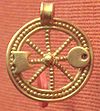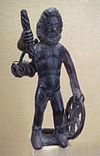Ialonus Contrebis
In ancient Celtic religion, Ialonus Contrebis or Ialonus or Gontrebis was a god (or perhaps two related gods) worshipped in what are now Lancashire and Provence. Ialonus is thought to be the god of clearings and/or meadows.
Name
The name Ialonus, which may have designated a god of clearing, derives from the Celtic stem ialo(n)- ('cleared place, clearing'; cf. Middle Welsh ial 'clearing', an-ial 'wasteland').[1][2] The stem ialon- also had the meaning 'village' in Gaulish. In the words of Xavier Delamarre, "In forest-covered Gaul, a village was essentially established by clearing a wood."[1]
The name Contrebis is based on the prefix con- ('with, together') attached to the root -treb- ('settlement'; cf. Old Irish treb, Middle Welsh tref, Old Breton treff 'town, dwelling-place'). It can be compared with the Celtiberian place name Contrebia, meaning 'conurbation'.[3][4]
Cult
He is known from three dedicatory inscriptions. One, at Lancaster, was dedicated (in the dative) to Deo Ialono Contre Sanctissimo ("to the holiest god Ialonus Contre[bis]"); another, at Overborough or Over Burrow near Kirkby Lonsdale, to Deo San Gontrebi ("to the holy god Gontrebis").[5] In the third inscription, found at Nîmes in Provence, Ialonus was invoked in conjunction with the goddess Fortune.[6]
References
- ^ a b Delamarre 2003, p. 186.
- ^ Matasović 2009, s.v. *yalo-.
- ^ Delamarre 2003, p. 301.
- ^ Matasović 2009, p. 388.
- ^ RIB 600 and 610 Archived 2007-07-13 at the Wayback Machine, online at www.Roman-Britain.org.
- ^ L'Arbre Celtique. Ialonus
Bibliography
- Delamarre, Xavier (2003). Dictionnaire de la langue gauloise: Une approche linguistique du vieux-celtique continental. Errance. ISBN 9782877723695.
- Matasović, Ranko (2009). Etymological Dictionary of Proto-Celtic. Brill. ISBN 9789004173361.
- Miranda Green (1997). Dictionary of Celtic Myth and Legend. Thames and Hudson Ltd, London.


